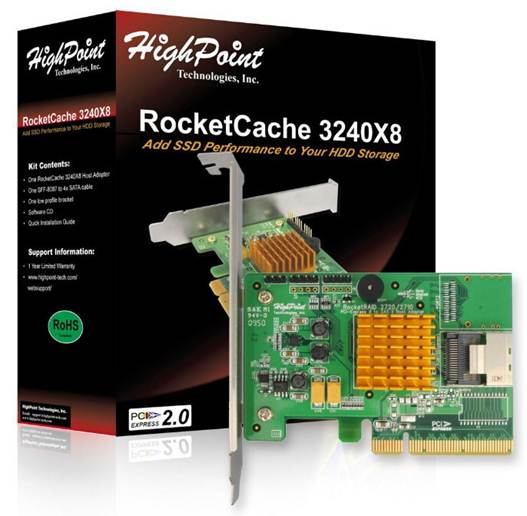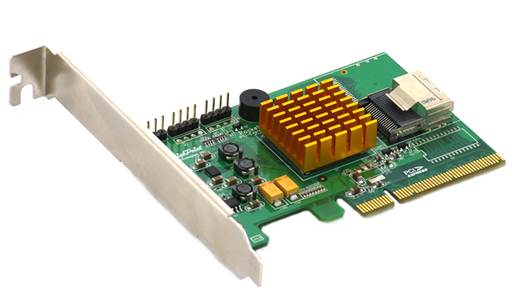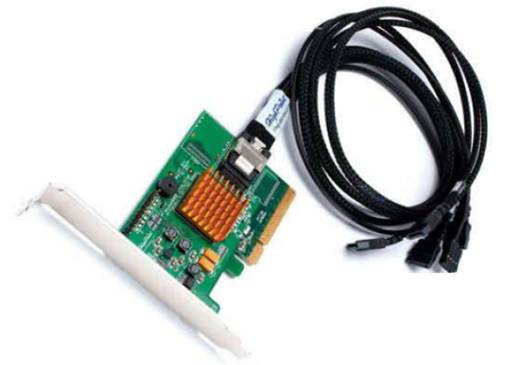It’s tough to wrap your head around HighPoint’s RocketCache,
so we’ll try to sum it up as being simply crazy performance, if you’re willing
to deal with the configuration hassles.
The RocketCache is a x8 PCle 2.0 card that lets you connect
up four SATA devices to it via a Medusa-like cable with four SATA 6Gb/s
connectors on it. The card lets you run two SSDs for caching, or more crazy –
one HDD with three SSDs for in same caching. That’s not all. You can select
between maximum performance, maximum performance with cache protection, RAID 1
with two hard drives and two SSDs for caching speed (maximum performance and
protection), and maximum protection, which is RAID 1 with cache written to
disks. One important note is that this device is not bootable, which is very
unfortunate.

HighPoint
RocketCache 3240x8
To test the RocketCache, we grabbed a WD 1TB Black drive,
two OCZ Vertex 4 SSDs, and one Intel 335 Series SSD, and we ran all tests in
Maximum Performance mode, which takes roughly 22GB from each SSD and stripes it
together into a 66GBcache. Like other caching products. The size of the 1TB
drive remained unchanged, and the extra space on the SSDs not being used for
caching – about 217GB or so – is also still available as individual volumes.
Since each SSD has its own lane to send and receive data, the configuration is
theoretically able to saturate the PCle interface with up to 1,500MB/s transfer
speeds, and we got very close to that in testing with all four drives
connected.
First, we connected just the hard drive by itself, and then
the Vertex 4 SSD by itself, and ran out test to show you what each drive is
capable of by its lonesome (see benchmark chart). We then ran the HDD with each
SSD added, one at a time, and ran our tests several times in order to see if
performance would improve as the card began to cache the data used in the
tests. Sure enough, it did, and each successive test run showed us increasing
speed until we hit a ceiling. It didn’t take long for the 1TB hard drive to
become as fast as an SSD, and in many cases performance surpassed that if the
lone Vertex 4 SSD, which is not surprising. As an example, when we ran HD Tune
on the one-SSD-plus-1TB combo, we initially saw the drive hit 107MB/s
sequential read speeds (the same score it hit on its own), then 169MB/s on the
next run, then 194MB/s, and on it went all the way up to 242MB/s. PCMark would
also show us a “drive-only” score first, around 5,000, then suddenly jump to
40,000 or so – a huge increase in speed.

The RocketCache works as advertised, in other words. The
only problem is, who would use this device? We don’t see it being used with
three SSDs, due to expense (small, fast SSDs aren’t that cheap), though if you
can swing it you’ll be a happy camper. The more interesting aspects are the
RAID 1 option, which grant you huge-drive security with the safety of RAID and
the speed advantage of drive caching. That is a truly unique combination of
performance and security, and makes the RocketCache an interesting product that
would kicks ass if we could boot from it.

One SSD as cache
is cute, but the RocketCache lets you use up to three
Verdict HighPoint RocketCache 3240x8: 9
+ Lots of cash: SSD speed for any rotating hard drive;
multiple configuration options; impressive speed.
- Lots of rash: Semi-expensive; not bootable.
Best scores are bolded. All drives tested on our hard drive
test bench: a stock-clocked Intel Core i5-2500K CPU on an Intel DZ77GA-70K
motherboard with 4GB DDR3, running Windows 7 Professional 64-bit. All tests
performed using native Intel 6Gb/s SATA chipset with IRST version 10.1 drivers.
Information
§ Price: $160
§ Website: www.highpoint-tech.com
Specifications
§
PDI-Express 2.0 x8
§
4 SATA 6Gb/s Channels
§
Marvell 88SE9485 Controller
§
1 x SFF-8087 Port
§
Support up to 4 SATA SSD’s/ HDD’s
§
4 Cache Modes
§
Backwards compatible with PCI-E 1.0
§
Driver support for Microsoft Windows 7, 2008, Vista
§
Non-bootable
§
1 year warranty
Verdict
WD 1TB
Black
§
Avg. Sustained Read (MB/s): 139.2
§
Avg. Sustained Write (MB/s): 138.0
§
4KB Read (IOPS): 166
§
4KB Write (IOPS): 234
§
64KB File Read (MB/s): 139.7
§
64KB File Write (MB/s): 139.4
§
Average read (MB/s): 107.3
§
PCMark Vantage x64: 5,933
OCZ
Vertex 4
§ Avg. Sustained Read
(MB/s): 464
§ Avg. Sustained
Write (MB/s): 500.6
§ 4KB Read (IOPS):
6,876
§ 4KB Write (IOPS):
16,452
§ 64KB File Read
(MB/s): 383
§ 64KB File Write
(MB/s): 497
§ Average read
(MB/s): 298.2
§ PCMark Vantage x64:
43,748
1 SSD
and 1TB HDD
§ Avg. Sustained Read
(MB/s): 368
§ Avg. Sustained
Write (MB/s): 423
§ 4KB Read (IOPS):
1,900
§ 4KB Write (IOPS):
12,974
§ 64KB File Read
(MB/s): 349
§ 64KB File Write
(MB/s): 447
§ Average read
(MB/s): 242
§ PCMark Vantage x64:
37,674
2 SSD
and 1TB HDD
§ Avg. Sustained Read
(MB/s):630.3
§ Avg. Sustained
Write (MB/s): 830.1
§ 4KB Read (IOPS):
1,902
§ 4KB Write (IOPS):
13,344
§ 64KB File Read
(MB/s): 638
§ 64KB File Write
(MB/s): 805
§ Average read
(MB/s): 307
§ PCMark Vantage x64:
44,438
3 SSD
and 1TB HDD
§ Avg. Sustained Read
(MB/s): 969.6
§ Avg. Sustained
Write (MB/s): 737
§ 4KB Read (IOPS):
2,037
§ 4KB Write (IOPS):
14,454
§ 64KB File Read
(MB/s): 791
§ 64KB File Write
(MB/s): 895
§
Average read (MB/s): 297.4
§
PCMark Vantage x64: 46,032
|